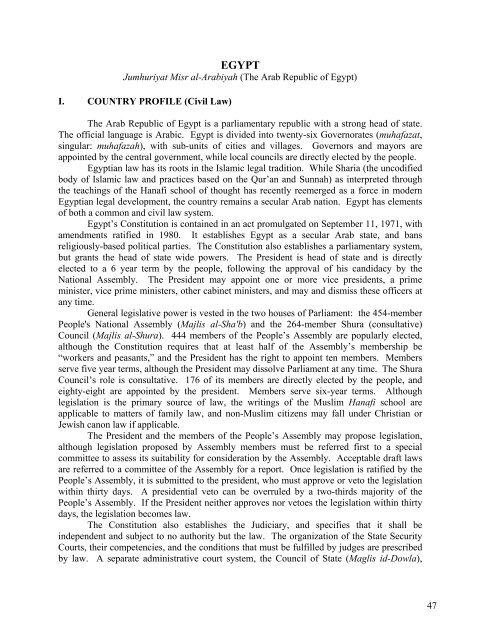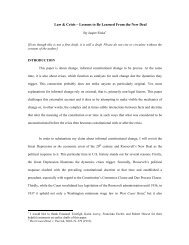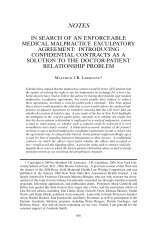Guide to Foreign and International Legal Citations - New York ...
Guide to Foreign and International Legal Citations - New York ...
Guide to Foreign and International Legal Citations - New York ...
Create successful ePaper yourself
Turn your PDF publications into a flip-book with our unique Google optimized e-Paper software.
EGYPT<br />
Jumhuriyat Misr al-Arabiyah (The Arab Republic of Egypt)<br />
I. COUNTRY PROFILE (Civil Law)<br />
The Arab Republic of Egypt is a parliamentary republic with a strong head of state.<br />
The official language is Arabic. Egypt is divided in<strong>to</strong> twenty-six Governorates (muhafazat,<br />
singular: muhafazah), with sub-units of cities <strong>and</strong> villages. Governors <strong>and</strong> mayors are<br />
appointed by the central government, while local councils are directly elected by the people.<br />
Egyptian law has its roots in the Islamic legal tradition. While Sharia (the uncodified<br />
body of Islamic law <strong>and</strong> practices based on the Qur’an <strong>and</strong> Sunnah) as interpreted through<br />
the teachings of the Hanafi school of thought has recently reemerged as a force in modern<br />
Egyptian legal development, the country remains a secular Arab nation. Egypt has elements<br />
of both a common <strong>and</strong> civil law system.<br />
Egypt’s Constitution is contained in an act promulgated on September 11, 1971, with<br />
amendments ratified in 1980. It establishes Egypt as a secular Arab state, <strong>and</strong> bans<br />
religiously-based political parties. The Constitution also establishes a parliamentary system,<br />
but grants the head of state wide powers. The President is head of state <strong>and</strong> is directly<br />
elected <strong>to</strong> a 6 year term by the people, following the approval of his c<strong>and</strong>idacy by the<br />
National Assembly. The President may appoint one or more vice presidents, a prime<br />
minister, vice prime ministers, other cabinet ministers, <strong>and</strong> may <strong>and</strong> dismiss these officers at<br />
any time.<br />
General legislative power is vested in the two houses of Parliament: the 454-member<br />
People's National Assembly (Majlis al-Sha'b) <strong>and</strong> the 264-member Shura (consultative)<br />
Council (Majlis al-Shura). 444 members of the People’s Assembly are popularly elected,<br />
although the Constitution requires that at least half of the Assembly’s membership be<br />
“workers <strong>and</strong> peasants,” <strong>and</strong> the President has the right <strong>to</strong> appoint ten members. Members<br />
serve five year terms, although the President may dissolve Parliament at any time. The Shura<br />
Council’s role is consultative. 176 of its members are directly elected by the people, <strong>and</strong><br />
eighty-eight are appointed by the president. Members serve six-year terms. Although<br />
legislation is the primary source of law, the writings of the Muslim Hanafi school are<br />
applicable <strong>to</strong> matters of family law, <strong>and</strong> non-Muslim citizens may fall under Christian or<br />
Jewish canon law if applicable.<br />
The President <strong>and</strong> the members of the People’s Assembly may propose legislation,<br />
although legislation proposed by Assembly members must be referred first <strong>to</strong> a special<br />
committee <strong>to</strong> assess its suitability for consideration by the Assembly. Acceptable draft laws<br />
are referred <strong>to</strong> a committee of the Assembly for a report. Once legislation is ratified by the<br />
People’s Assembly, it is submitted <strong>to</strong> the president, who must approve or ve<strong>to</strong> the legislation<br />
within thirty days. A presidential ve<strong>to</strong> can be overruled by a two-thirds majority of the<br />
People’s Assembly. If the President neither approves nor ve<strong>to</strong>es the legislation within thirty<br />
days, the legislation becomes law.<br />
The Constitution also establishes the Judiciary, <strong>and</strong> specifies that it shall be<br />
independent <strong>and</strong> subject <strong>to</strong> no authority but the law. The organization of the State Security<br />
Courts, their competencies, <strong>and</strong> the conditions that must be fulfilled by judges are prescribed<br />
by law. A separate administrative court system, the Council of State (Maglis id-Dowla),<br />
47
















